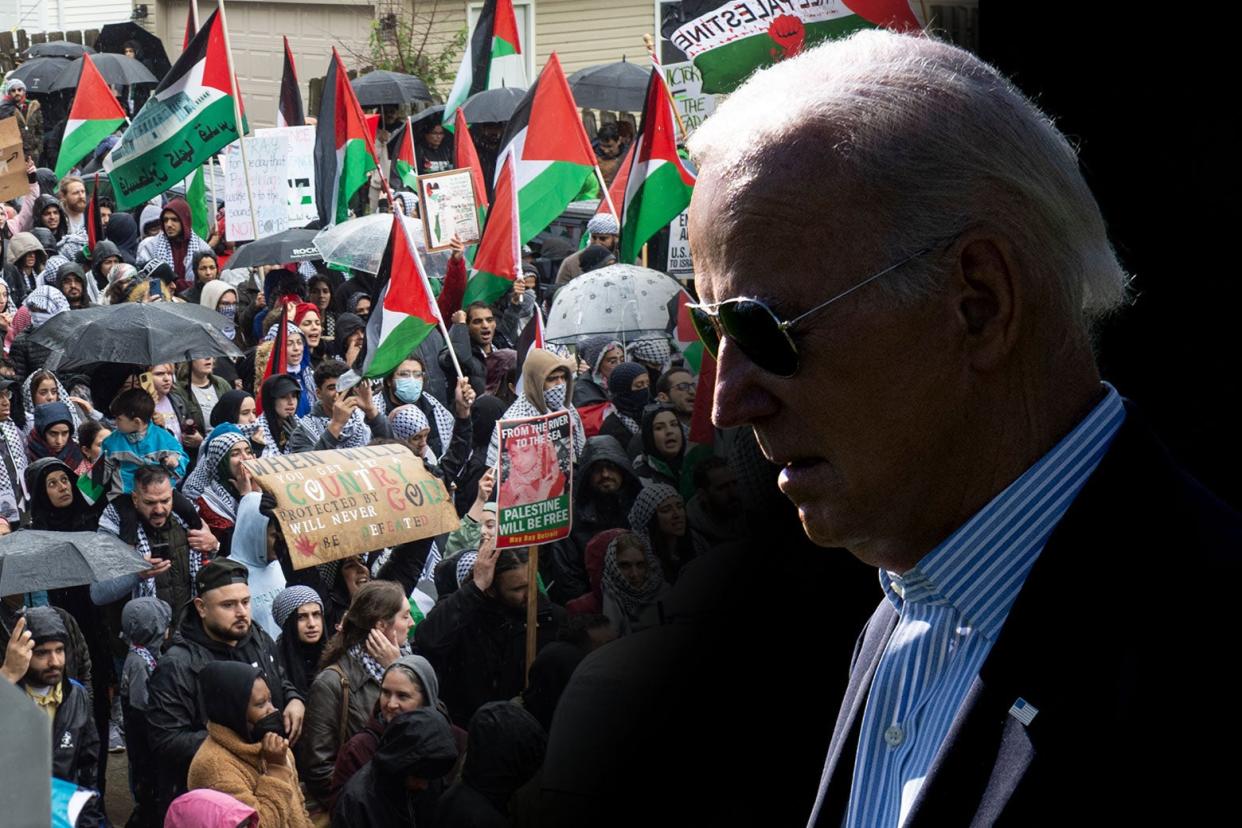Biden’s Israel Policy Threatens to Cost Him Yet Another Crucial Bloc of Supporters

- Oops!Something went wrong.Please try again later.
- Oops!Something went wrong.Please try again later.
Joe Biden is no stranger to alarming poll numbers. Since at least the moment he announced his bid for reelection in 2024, he’s had a hard time ginning up much enthusiasm. His head-to-head polling versus any number of Republican candidates in any number of swing states is, frankly, bad; his favorability ratings among most every demographic are—to put it delicately—uninspired.
But the war in Gaza is making things much, much worse, a trend punctuated by an astonishing poll from the Arab American Institute published Tuesday.
Only 17 percent of Arab American voters say they will vote for Biden in 2024, according to the poll. That’s contrasted with 59 percent of Arab American voters who said they would vote for Biden in 2020. Worse yet, the damage extends partywide. Just 23 percent of Arab Americans now identify with the Democratic Party, according to the poll, marking the first time in the 26 years the organization has been tracking the group’s party affiliation that a majority of Arab Americans did not claim to prefer the Democratic Party to Republicans and independents.
Though Biden has tried to walk a fine line in some of his messaging about the war in Gaza, he has simultaneously pledged unwavering, total support for Israel, even as Israeli Prime Minister Benjamin Netanyahu has pushed forward with a vicious retaliatory air and ground campaign in a war effort that has already killed 10,000 Palestinian civilians.
James Zogby, president of the Arab American Institute, the group that conducted the polling, said the survey results were “deeply distressing.”
“The eight years of George W. Bush caused a huge transformation in Arab American party preference. Everything from Iraq to the civil liberties issues at home to the rhetoric of other Republicans was a real turnoff. By the time we got to 2008, they were 2-to-1 Democrats,” said Zogby of Arab Americans. “In just a four-week period, it went away. It went through the floor.”
There are roughly 3 million Arab Americans residing in the U.S., and they are of various religious backgrounds (Muslim, Jewish, Christian, and more) and can trace their roots to numerous countries of origin. The majority voted for Biden in 2020.
The population is not huge, and not politically monolithic. Some pundits and politics-knowers have taken to tweets and op-eds to explain that the Arab Americans’ current disaffection with the president is little to worry about in regard to his 2024 prospects. The political upside of standing with Israel, they argue, far outweighs the downside of an outraged, dispersed, and relatively small minority group.
But this overlooks the importance of the areas where Arab American communities live. In Michigan, the all-important swing state which has been among Democrats’ greatest success stories post-Trump, there resides one of the largest Arab American populations in the country (mostly in Dearborn, a city at the heart of the state’s auto industry). In 2020, the overwhelming majority of Arab American voters in Dearborn went for Biden, a crucial demographic constituency.
Some 277,000 Arab Americans live in Michigan, and Biden won the state by only 155,000 votes in 2020. Frustration with the Democratic Party is so high right now in Dearborn that Democratic Gov. Gretchen Whitmer canceled a planned visit this week. Just a few weeks ago, Biden was cheered in Michigan as he walked the picket line during the Union Auto Workers strike; now, despite that historic move supporting the union in its huge contractual victory, his party is persona non grata in the very same region.
Pennsylvania is another state where a significant population of Arab American voters has become core to Democratic statewide electoral success, and according to the Arab American Institute’s findings, there is a similar level of outrage toward the Biden response. Also, Pennsylvania has 182,000 Arab Americans; Biden won it in 2020 by 80,000 votes.
This is perilous math.
But there’s a broader reason to believe that Biden’s Israel policy—out of step with the 80 percent of Democrats, 57 percent of independents, and 56 percent of Republicans who told Data for Progress they support a cease-fire—is actually not good politicking. “Taking his cue from Netanyahu was just not necessary,” Zogby said of Biden. “Most American Jews are opposed to” Israel’s prime minister.
The collapse in support among Arab Americans is mirrored by cratering numbers among young voters as well, who have been similarly put off by Biden’s hawkish Israel policy. Young voters are a much larger and even more critical demographic when it comes to Democratic success. As the political strategy firm Catalist found in its post-mortem of the 2022 election, young voters were the crux of the surprise Democratic overperformance.
It’s a harrowing portent, and one that is clearly making the White House uneasy. Late Wednesday afternoon, the White House press secretary rolled out a statement hastily announcing a “first-ever national strategy to counter Islamophobia” that was short on details but that promised a “joint effort led by the Domestic Policy Council and the National Security Council” that would “counter the scourge of Islamophobia and hate in all its forms.”
Yes, the 2024 presidential election is a year away, and it’s long been assumed that Biden’s crappy favorability won’t much matter come Election Day, as people who “somewhat disapprove” of the president begrudgingly vote for him anyway. But the dam-breaking nature of the Arab American community’s disaffection is a sign that that lack of enthusiasm can easily and quickly turn into a more profound rejection—which would make it nearly impossible for Biden to win reelection.
“I’ve been on the Democratic National Committee for 30 years,” Zogby told me. “I’ve worked really hard to get Arab Americans into the party.” Worried about the poll results, Zogby said: “This is not something that sits well with me at all.” He added: “I’m struggling to find a way forward.”

